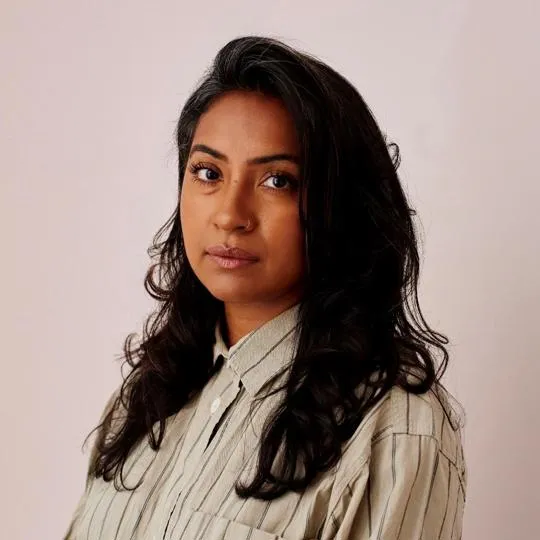
Renasha Khan
Lecturer in Religion, Politics and Ethics
Research interests
- Religion
Pronouns
She/ Her
Biography
I am a Lecturer in Religion, Politics and Ethics at King’s College London. I hold a PhD in the Sociology of Religion from the same department, where my research critically examines the impact of social media on the lives of British Bangladeshi women in Tower Hamlets. My work explores how digital experiences reshape narratives surrounding Muslim women in contemporary culture, focusing on agency, identity, and belonging through an ethnographic lens. My work contributes to wider debates on Muslim women's subjectivities, digital sociology, and contemporary configurations of religious identity in diaspora contexts.
Alongside this research, I have developed publications that further interrogate the intersections of digital culture, visual self-representation, and racialised religious identity. My scholarship is shaped by a commitment to decolonial and feminist methodologies, and I have actively contributed to the development of decolonised pedagogies within the Department of Theology and Religious Studies at King’s, including co-designing and delivering undergraduate and master's modules that challenge dominant epistemologies and centre lived experience.
In addition to my academic work, I am an accomplished documentary filmmaker, having produced and directed films for leading broadcasters such as the BBC, Sky Arts, Channel 4, National Geographic Channel, and The Guardian. I continue to engage with the media industry as a media consultant and executive producer, contributing to innovative projects that bridge scholarship and creative storytelling.
Bluesky: @renasha.bsky.social
Research interests
- Lived Religion
- Digital Religion
- Gender and Religion
- Contemporary Islam
- Digital ethnography
My research critically engages with the dynamics of digital experiences, focusing on how religious identities are enacted and negotiated online in the everyday lives of Muslim women. I explore the intricate intersections of religion, gender, and culture in the British Bangladeshi context, analysing how digital spaces become sites for contesting agency and constructing selfhood. Extending this inquiry, my work interrogates the shifting currents of contemporary Islamic thought as they are mediated, contested, and reimagined through digital media, revealing how globalised Islam adapts and reconfigures itself within this rapidly evolving technological landscape.
Teaching
I teach across religion, politics, ethics, sociology, race, and gender at undergraduate and postgraduate levels. My pedagogy is rooted in decolonial and intersectional feminist frameworks, with a commitment to centring marginalised voices and interrogating dominant systems of power and knowledge. I view the classroom as a collaborative space, where co-created curricula and community-engaged learning practices allow students to take ownership of their education and connect theory to lived experience. My teaching often draws on film, digital media, and storytelling to open up new ways of knowing and understanding. I encourage students to think critically and creatively, challenge disciplinary boundaries, and see learning as a political and imaginative act.
Expertise and public engagement
My expertise sits at the intersection of religion, race, gender, politics, and ethics, underpinned by a decolonial and intersectional feminist approach. I am deeply committed to public engagement and knowledge exchange that extends beyond the academy. As a director at Forward Culture, I work on mentoring projects empowering South Asian women through professional, arts and cultural initiatives. My media practice as a filmmaker and consultant allows me to translate complex ideas into accessible and impactful storytelling across broadcast, digital, and community platforms. I serve on the executive committee of the British Sociological Association's reading group for Sociology of Religion as the Equality, Diversity and Inclusion joint-lead, and I am the founder of the Religion, Neurodiversity and Disability Network, which creates space for inclusive, cross-sector dialogue around embodiment, access, and belonging.
My academic practice is equally rooted in transformative pedagogy, including the co-development of a decolonised undergraduate module on Religion, Race, and Gender. I am increasingly involved in policy-focused work, engaging with institutions and policymakers to ensure research on digital rights, lived religion and marginalised communities shapes more just and inclusive futures. Across all areas of my work, I am committed to pushing boundaries - connecting theory, creativity, and activism to rethink who knowledge is for, how it is produced, and where it belongs.
Selected publications
Khan, R. (2025). Political activism among British Bangladeshi women from Tower Hamlets: Performance. Identities: Global Studies in Culture and Power.
Khan, R. (2025). Muslim Joy: Rewriting Muslim Womanhood in the Age of Social Media(Manuscript in preparation). Bloomsbury.
Waldock, K. E., & Khan, R. (2025). Working as ‘rebellious disruptors’: Neuroqueering and cripping academic spaces within the sociology of religion. Religion
Khan, R. (2023). Autoethnographic perspectives on Muslim women's lives online. In N. Slee, D. Llewellyn, K. Wasey, & L. Taylor-Guthartz (Eds.), Female faith practices: Qualitative research perspectives (1st ed.). Routledge.
DeHanas, D. N., Khan, R., & Mandaville, P. (2020). Living the Muslim Atlantic: Race, gender, and the politics of marginality. London: King’s College London.
